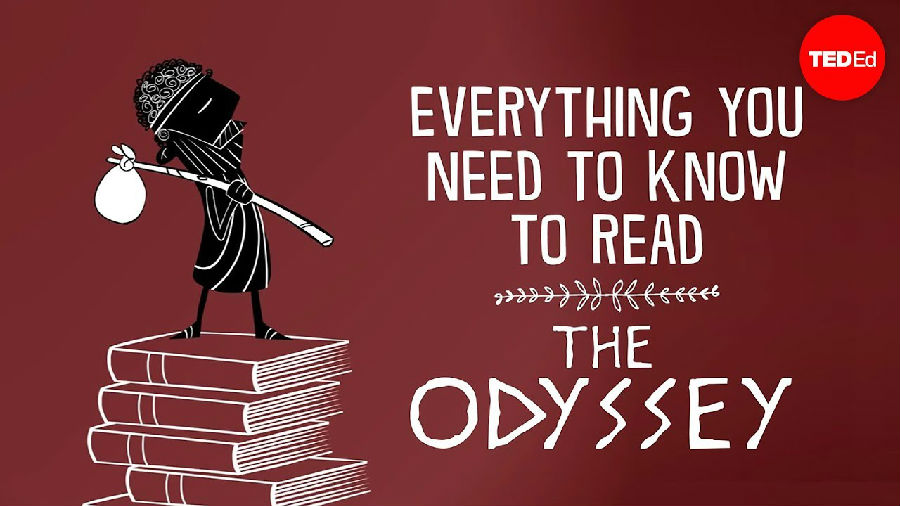(单词翻译:单击)
A close encounter with a man-eating giant,
一场与食人巨人的惊险经历,
a sorceress who turns men into pigs, a long-lost king taking back his throne.
一个将人类变成猪的女巫师,一位欲夺回权位的国王。
On their own, any of these make great stories, but each is just one episode in the 'Odyssey,'
这些题材本已能创作出精彩的故事,却只是文学巨作《奥德赛》里的部分篇章,
a 12,000-line poem spanning years of Ancient Greek history, myth, and legend.
《奥德赛》是一部长达一万两千句、传颂古希腊历史,神话与传说的诗作。
How do we make sense of such a massive text that comes from and tells of a world so far away?
而我们要如何理解这一部讲述来自远久时代与世界的文学巨作?
The fact that we can read the 'Odyssey' at all is pretty incredible,
事实上,我们现时今日能够阅读《奥德赛》本已是非常难能可贵的事,
as it was composed before the Greek alphabet appeared in the 8th century BCE.
因为《奥德赛》于公元前8世纪创作,比古希腊文字的出现来得更早。
It was made for listeners rather than readers, and was performed by oral poets called rhapsodes.
相较于阅读,《奥德赛》的文本更适合观众用听的去感受,并一般由“游吟诗人”吟诵。
Tradition identifies its author as a blind man named Homer.
《奥德赛》的创作者据说是一位名为荷马的盲人。
But no one definitively knows whether he was real or legendary.
但他是否真的存在,或只是一个传说,至今无人能确认。
The earliest mentions of him occur centuries after his era.
《奥德赛》问世的几个世纪后,才出现了记录荷马这个人物的第一个文本。
And the poems attributed to him seem to have been changed and rearranged many times by multiple authors
此时,他所写的诗词也似乎已由多位文人多次改编,
before finally being written down in their current form.
再以现今的呈现方式流传。
In fact, the word rhapsode means stitching together,
事实上,游吟诗人的单词“rhapsodes”的意思便是“编织在一起”。
as these poets combined existing stories, jokes, myths, and songs into a single narrative.
这些诗人将现有的故事、笑话、传说和歌曲编辑成一个统一的文本。
To recite these massive epics live, rhapsodes employed a steady meter,
为了能够活灵活现地呈现这些作品,游吟诗人使用节拍仪器,
along with mnemonic devices, like repetition of memorized passages or set pieces.
并通过反复的背诵部分篇章或以固定形式背下文本。
These included descriptions of scenery and lists of characters,
当中就包括对风景和人物的描述,
and helped the rhapsode keep their place in the narrative,
这些方法有助游吟诗人记录吟诵的过程,
just as the chorus or bridge of a song helps us to remember the next verses.
就如副歌能够帮助歌手记住下段主歌一般。
Because most of the tales were familiar to the audience, it was common to hear the sections of the poem out of order.
由于观众对《奥德斯》里的故事均已相当熟悉,因此游吟诗人在表演时经常将章节的顺序打乱。
At some point, the order became set in stone and the story was locked into place as the one we read today.
到了某个阶段,段落的顺序便定下了,成了我们现今阅读的版本。
But since the world has changed a bit in the last several thousand years,
但过去数千年,世界也经历了不少改变,
it helps to have some background before jumping in.
因此在阅读《奥德斯》之前应先了解一下其背景。

The 'Odyssey' itself is a sequel to Homer's other famous epic, the 'Iliad,' which tells the story of the Trojan War.
《奥德斯》是荷马另一部讲述特洛伊战争的作品《伊利亚特》的续集。
If there's one major theme uniting both poems, it's this:
如果存在一个联结两部作品的主题,
do not, under any circumstances, incur the wrath of the gods.
那就是不论在任何情况下,都不可激怒神明。
The Greek Pantheon is a dangerous mix of divine power and human insecurity, prone to jealousy and grudges of epic proportions.
希腊万神殿充斥着神明的力量和人类因醋意和怨气所促成的不安全感。
And many of the problems faced by humans in the poems are caused by their hubris,
诗篇中,人类所面临的许多问题,都是因为他们的傲慢
or excessive pride in believing themselves superior to the gods.
或他们对比神明的优越感所造成的。
The desire to please the gods was so great
当时,因为人类对神明极度崇拜,
that the Ancient Greeks traditionally welcomed all strangers into their homes with generosity for fear that the strangers might be gods in disguise.
希腊人因担心神明会伪装成人类,所以总会在家中大方招待来自各方的陌生人。
This ancient code of hospitality was called xenia.
这种古代的礼待规范,称作“xenia”。
It involved hosts providing their guests with safety, food, and comfort,
主人会为客人提供保护、食物和舒适的落脚处,
and the guests returning the favor with courtesy and gifts if they had them.
而客人则会礼貌相待或回赠礼物,以示谢意。
Xenia has a significant role in the 'Odyssey,' where Odysseus in his wanderings is the perpetual guest,
“xenia”是《奥德赛》里非常重要的一个元素,主人公奥德修斯浪迹天涯,是常年漂泊的旅客,
while in his absence, his clever wife Penelope plays non-stop host.
而他聪明过人、留守家中的妻子珀涅罗珀则是款待旅客的宿主。
The 'Odyssey' recounts all of Odysseus's years of travel,
《奥德赛》讲述奥德修斯多年漂流的事迹,
but the narrative begins in medias res in the middle of things.
但故事却是从中间开始的。
Ten years after the Trojan War, we find our hero trapped on an island,
特洛伊战争十年后,主人公奥德修斯仍受困在一座岛屿上,
still far from his native Ithaca and the family he hasn't seen for 20 years.
与家乡伊萨卡和20年未见的家人相隔甚远。
Because he's angered the sea god Poseidon by blinding his son, a cyclops,
奥德修斯因害得海神的儿子失明,激怒了海神,
Odysseus's passage home has been fraught with mishap after mishap.
因此回家的路程困难重重。
With trouble brewing at home and gods discussing his fate,
在家里麻烦事不断发生,众神讨论奥德修斯命运的同时,
Odysseus begins the account of those missing years to his hosts.
奥德修斯开始讲述他与各位宿主的机遇和事迹。
One of the most fascinating things about the 'Odyssey'
《奥德赛》最让人称奇的地方,
is the gap between how little we know about its time period and the wealth of detail the text itself contains.
在于人们虽然对那个时代的认知不深,但《奥德赛》的描述却如此的巨细靡遗。
Historians, linguists, and archeologists have spent centuries searching for the ruins of Troy
历史学家、语言学家和考古学家在特洛伊的遗址上进行了数百年的考察,
and identifying which islands Odysseus visited.
并认出奥德修斯所访过的岛屿。
Just like its hero, the 24-book epic has made its own long journey
就如文中的主人公,这部共分成24集的文学巨作也经历了一场久远而壮丽的旅程,
through centuries of myth and history to tell us its incredible story today.
将数百年的传说和历史流传至今。


